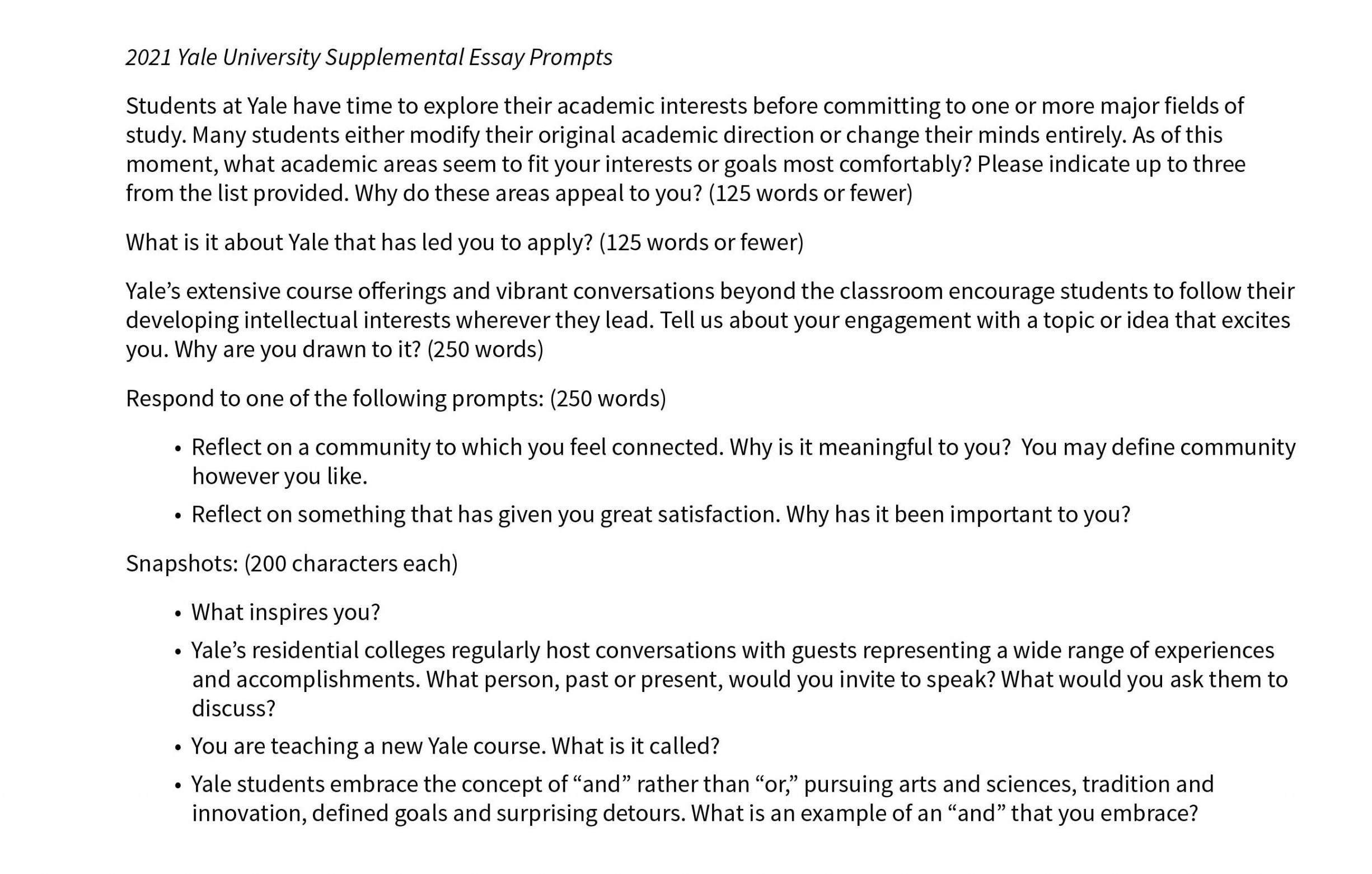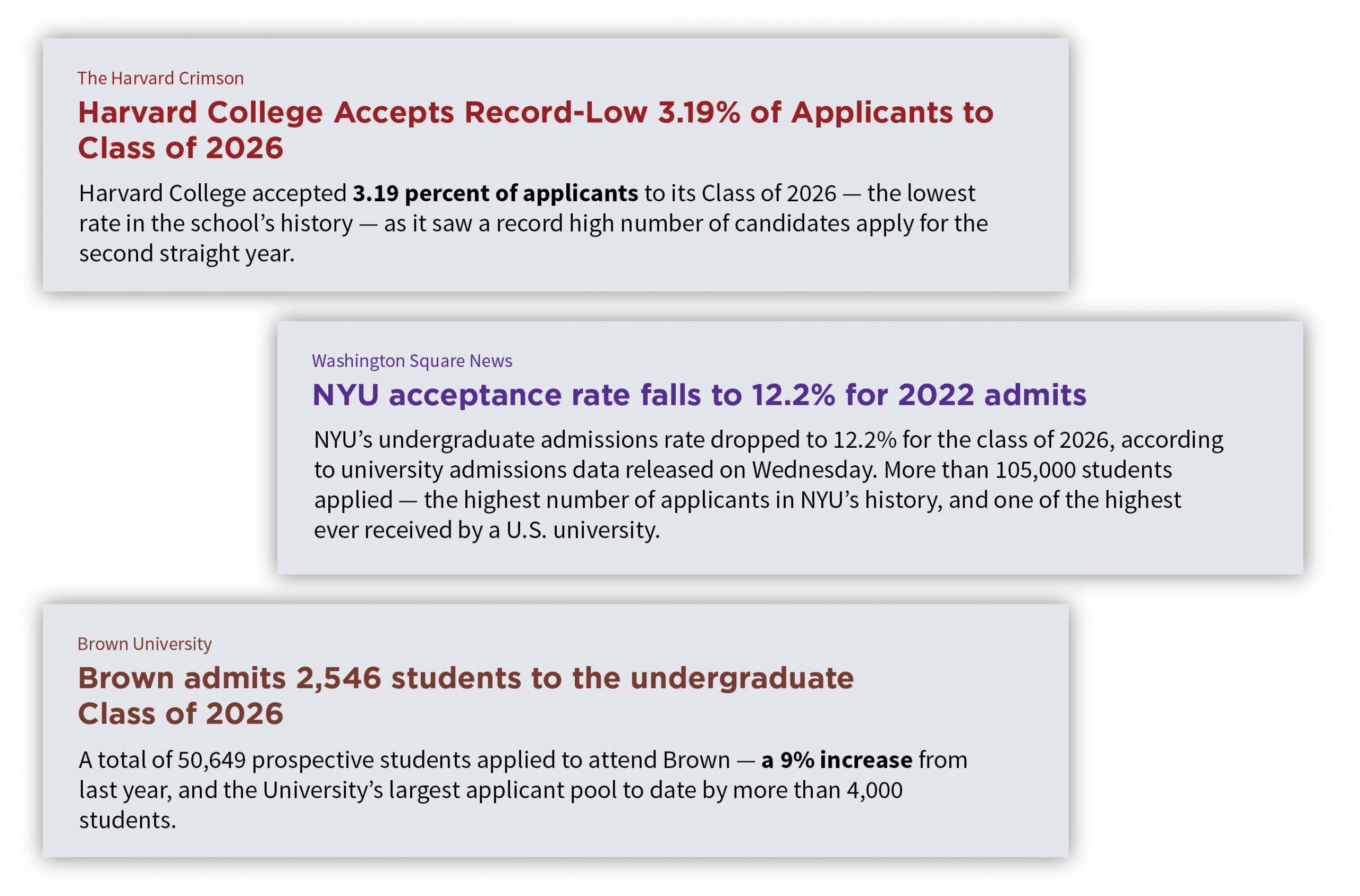
Assessment of 2022 College Admissions
A College Counselor’s Assessment of 2022 College Admissions
It’s no secret that the 2021-2022 college admissions cycle presented challenges to students all across the board. Using this knowledge and strategy, the Academic Counseling Services at MEK Review shape our strategies for the upcoming admissions cycle.
RECORD LOW ACCEPTANCE RATES & RECORD HIGH APPLICANT NUMBERS
It’s obvious, in numbers, that this was the most difficult year for college admissions, possibly in history. And unfortunately, all signs show that this year will not be an outlier, but rather a trend.
Students and parents always ask me why this is, and the answer comes down to pretty simple math. The number of seats that a college or university can offer to one graduating class stays approximately the same from year to year, but the number of applicants keeps growing. So, to maintain their quota, colleges need to take a smaller percentage of the applicant pool.
The Common Application reported early this year that the application volume through the middle of February increased nearly 10% from the year before, which was already 10% more than the year before that, even though the number of students graduating from high school from year to year has stayed generally stable. What this means is that students are applying to more and more schools each year.
LONGER COLLEGE LIST ≠ MORE ACCEPTANCES
Every year, there is a significant number of students that I need to remind that no matter how many schools they apply to, they can only eventually go to one of them. Nevertheless, every year, there is always at least one student who insists upon applying to every college that they have heard about over the past year and more.
Why Shouldn’t I Apply to More Schools?
An application, no matter how simple, requires time, energy, and money.
For example, an application to Yale University consists of four short essays and four “snapshots”: 200-character blurbs that, when written well, can serve as colorful windows into a student’s personality and character.

An application to Northeastern University does not consist of any supplemental essays, but does ask for a resume, which needs to be well-crafted and act as a supporting piece for the Common Application activities list.
So, really, there is no truly easy application—at least within the top 50 colleges and universities in the United States.
High school seniors are busy. They have to keep up their grades, maintain their commitments to their extracurricular activities, take on leadership as necessary, and sometimes even finish up their standardized tests. On top of that, they need to complete their college applications. Time and energy are not available in unlimited supply, but this time and energy is what makes for a successful application.
More applications are more commitments, and as a college counselor, I would like to discourage any student from spreading themselves too thin during these last pivotal moments before college.
Longer College List ≠ More Acceptances
Let’s look at numbers. Below are 6 students who completed their college applications with MEK Review:
| Name* | Number of Submitted Applications | Number of Acceptances |
| Kate | 31 | 9 |
| Jane | 19 | 8 |
| Brian | 21 | 7 |
| Benjamin | 11 | 8 |
| Anna | 16 | 8 |
| Alex | 17 | 7 |
*All names have been changed to maintain the confidentiality of the student.
Kate applied to 31 schools, opting to use both the Common Application and Coalition Application in order to accommodate all schools.** By the end of the application cycle, she was exhausted. She had written over 90 essays and submitted so many applications that every school looked the same as the other. Her essays were definitely well written, but they lacked energy. Eventually, she was accepted to 9 schools, only one more than the students who applied to 11, 16, and 19 schools.
**Students can apply to a maximum of 20 schools on the Common Application and Coalition Applications, respectively.
The number of colleges on one college list is not proportional to the number of acceptances that a student receives. So, as long as this is the case, there is even less reason to apply to such a large number of schools. After all, we can only choose one school to attend, so we want to make each application count.
IMPORTANCE OF QUALITATIVE MATERIALS
With the increase of applicants, and consequently, the competition for admissions, it’s inevitable that students with similarly high metrics (GPA, SAT/ACT, class rank, etc.) and similar extracurricular experiences will gather in the applicant pool at each school. Plus, with the test optional policy in place at most colleges and universities, there are even fewer data points that admissions officers can use to assess a student.
At this point, admissions officers need to turn to the materials that bring the application to life: the application essays and letters of recommendation. These qualitative materials are what advocate for you, fighting for you to be a part of the campus. When written well, the essays and letters of recommendation connect all of the data points that are presented in your application to build an accurate picture of why you are who you are and why you want to study what you want to study.
STATISTICS ARE STILL STATISTICS

No matter how much college applications change, one thing that will always stay the same is that the initial filter of admissions will be a student’s numbers: GPA, SAT/ACT, class rank, etc. Students will be assessed upon these metrics before any other metrics are considered.
Consider the following student:
Emily* was one of my students during the past admissions cycle, and her activities were incredibly strong. She had an immense heart for advocacy, and for the past three years, she had completed her Girl Scouts Gold Award project on a cause that she cared about deeply. Through this project, she had developed an app, a website, and even an educational program to be used in elementary, middle, and high schools, as well as police stations and colleges/universities.
Through this project, she was invited to be on the New Jersey Coalition for this specific cause, and received the support of a New Jersey senator who eventually wrote her a letter of recommendation.
However, Emily also had a 3.57 unweighted GPA and an SAT score of 1490—far below the usual standards for admissions to her dream school, Princeton University. And while her activities shouted that she was not only a rigorous and ambitious student, but also one who would fit right into the community at Princeton University, her statistics showed otherwise.
She still applied to Princeton using their Restrictive Early Action policy because she knew that she would regret having not given it a shot, but the result was not surprising: denied.
While qualitative materials are incredibly important, for most top colleges and universities, they only really start making a difference when the student’s numbers are at a certain standard. And oftentimes, this standard lies in the near-perfect realm.
TEST SCORES STILL COUNT!
Yes, there are a select number of colleges that will not look at test scores, even if they are submitted, named test blind schools. However, there are far more schools that will definitely put your test scores into account if they are submitted.
It is true that students who do not have competitive standardized test scores do not need to submit them, thereby limiting the number of unfavorable data points in their application. However, for students who have less competitive GPAs, standardized tests provide good opportunities to compensate for this rigor and provide a separate metric of academic performance.
Students with top GPAs can use the SAT or ACT to bolster their GPAs and show that they can handle rigor on all fronts. Therefore, it is only helpful to have a good SAT or ACT score in order to have a competitive college application!
COLLEGES LOOKING TO FILL THEIR SPOTS WITH SURE BETS
As I mentioned earlier, I remind many students each year that no matter how many schools they apply to, they can eventually only choose one to actually attend. With students applying to more and more colleges and universities, that means that a smaller percentage of accepted students will matriculate into the incoming freshman class at one school. So, as this trend continues, colleges and universities look to put their investments into the students who will surely choose to attend the school if admitted: Early Decision applicants.
In the 2022-2023 admissions cycle, the University of Pennsylvania filled 51% of its upcoming freshman class during the Early Decision cycle. Barnard College filled 62% of the available seats during Early Decision, and even Boston University filled 50% of its upcoming class before even considering regular decision applicants. Granted, there was also a tremendous increase in the number of applications, but even so, the numbers make it clear that the Early Decision policy is a student’s best chance of getting into their dream school, now more than ever.
STRATEGY IS KEY

When we think about college admissions as a game, it is a game of strategy. Every student has strengths and weaknesses, and the application is all about how to accentuate our strengths while using our weaknesses in the best possible way. At MEK, we provide counseling to allow students to create the best possible college application package and celebrate the achievements and hard work that they have invested themselves in throughout their high school years.
If you would like to speak with a college counselor or a college essay coach, please contact me at acs@mekreview.com, and we’ll schedule a meeting right away!
I hope to speak with you soon!




